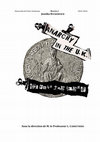Papers by Jess Ryckebusch

Master's dissertation, 2016
Matilda, "Lady of the English", Henry I's sole heir to whom his barons had, on three separate occ... more Matilda, "Lady of the English", Henry I's sole heir to whom his barons had, on three separate occasions, swore an oath, never became the first ruling Queen of England. Despite the strength of her claim, her throne went first to her cousin, Stephen of Blois, then to her son, Henry II.
Rather than depicting her actions and acknowledging her agency in the decades-long struggle that opposed her to Stephen, this study will show that most of her contemporaries will choose to focus on the men surrounding her, to the point that she is sometimes barely mentioned at all. That her role was reduced to such an extent in the chronicles is suspicious. Charters testify to her political power, in granting lands or titles, so writing Matilda out of her own history highlights contemporary concerns about the inheritance of lands and titles, in a changing Anglo-Norman society. In her biography of the empress, Marjorie Chibnall concludes by saying: "The real difficulty preventing her final triumph was that in twelfth-century England there was virtually no place for female succession".
This essay will, therefore, aim at analysing if we can objectively state that Matilda was unfit to rule, or to what extent she was not, and through what means her contemporaries undermined her claim, and ultimately her. In the end, a careful study of the chronicles and their language will show that what most chroniclers aimed at doing was defining her by comparison to her male relatives, and therefore in traditional terms of masculinity or femininity.
This study aims at being a part of a recent historiographical trend dedicated to analysing women’s role and power in medieval societies.











Uploads
Papers by Jess Ryckebusch
Rather than depicting her actions and acknowledging her agency in the decades-long struggle that opposed her to Stephen, this study will show that most of her contemporaries will choose to focus on the men surrounding her, to the point that she is sometimes barely mentioned at all. That her role was reduced to such an extent in the chronicles is suspicious. Charters testify to her political power, in granting lands or titles, so writing Matilda out of her own history highlights contemporary concerns about the inheritance of lands and titles, in a changing Anglo-Norman society. In her biography of the empress, Marjorie Chibnall concludes by saying: "The real difficulty preventing her final triumph was that in twelfth-century England there was virtually no place for female succession".
This essay will, therefore, aim at analysing if we can objectively state that Matilda was unfit to rule, or to what extent she was not, and through what means her contemporaries undermined her claim, and ultimately her. In the end, a careful study of the chronicles and their language will show that what most chroniclers aimed at doing was defining her by comparison to her male relatives, and therefore in traditional terms of masculinity or femininity.
This study aims at being a part of a recent historiographical trend dedicated to analysing women’s role and power in medieval societies.
Rather than depicting her actions and acknowledging her agency in the decades-long struggle that opposed her to Stephen, this study will show that most of her contemporaries will choose to focus on the men surrounding her, to the point that she is sometimes barely mentioned at all. That her role was reduced to such an extent in the chronicles is suspicious. Charters testify to her political power, in granting lands or titles, so writing Matilda out of her own history highlights contemporary concerns about the inheritance of lands and titles, in a changing Anglo-Norman society. In her biography of the empress, Marjorie Chibnall concludes by saying: "The real difficulty preventing her final triumph was that in twelfth-century England there was virtually no place for female succession".
This essay will, therefore, aim at analysing if we can objectively state that Matilda was unfit to rule, or to what extent she was not, and through what means her contemporaries undermined her claim, and ultimately her. In the end, a careful study of the chronicles and their language will show that what most chroniclers aimed at doing was defining her by comparison to her male relatives, and therefore in traditional terms of masculinity or femininity.
This study aims at being a part of a recent historiographical trend dedicated to analysing women’s role and power in medieval societies.